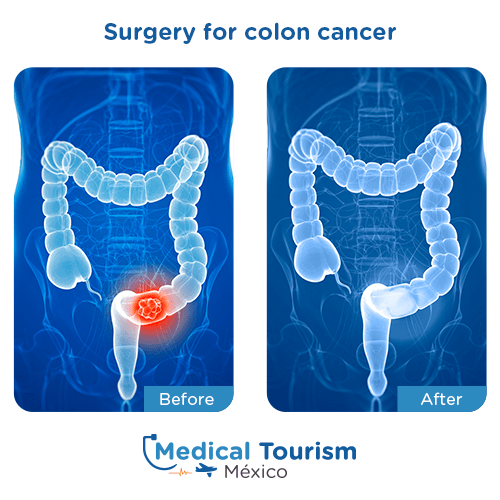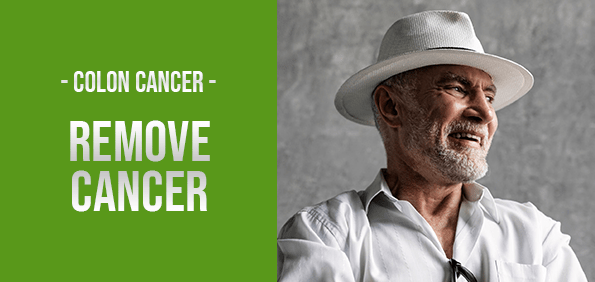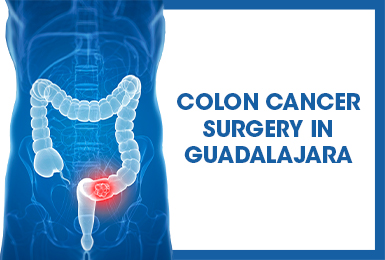The most reliable doctors in Mexico
Colon cancer - Colectomy information and locations in Mexico
Colon cancer or colorectal cancer begins in the final part of the digestive tract (large
intestine). Normally starts as a small benign clump of cells called polyps, eventually, these
become colon cancer.
Treatment usually involves colectomy surgery to remove cancer. Surgery consists of the partial
or total removal of the colon, how much is removed depends on the stage of cancer; smaller
growths will only need a small section of the colon to be removed, while larger growths could
cause the entire colon to be extracted. Specific cases might need chemotherapy and radiation
therapy.
Types of surgery for colectomy
Polypectomy
In smaller cancer or early stages, the polyps can be removed during a colonoscopy.
Colectomy
This procedure can be done as open or laparoscopic surgery. The surgeon accesses the
part where the cancer is, then a part of the entire colon is removed along with nearby
tissue. The healthy portions of the colon or rectum are connected so waste leaves your
body normally. In some cases, it can be connected to a colostomy bag that will
collect the waste.
Get colon cancer surgery with the best oncologists in Mexico!
Benefits
Can treat other conditions
Reduces the risk of recurrence
Stops benign growths from becoming cancer
Can be done as laparoscopic surgery
Reduces the risk of recurrence
Stops benign growths from becoming cancer
Can be done as laparoscopic surgery
Colon cancer
Procedure:
2 hrs.
Hospital stay: 2 - 3 days
Cleared to fly: 7 - 10 days
Hospital stay: 2 - 3 days
Cleared to fly: 7 - 10 days
After surgery
Out of town patients’ follow-ups are scheduled with the surgical oncologist after 7 - 12 days from colon cancer
surgery. Patients are clear for flying after 7 - 10 days from colon cancer surgery.
Note: Follow-ups can be arranged as face-to-face or virtually. If needed, you can go to your primary care physician to remove sutures or get medication adjustments.
As an Amazon Associate, we earn from qualifying purchases.
Take a look at one of our medical tourism essentials for oncology surgery.
Take a look at one of our medical tourism essentials for oncology surgery.
Before and after images
View additional images for this procedure.

View more


Locations
Select the city of your choice to seethe doctors profile.
Chihuahua, Chih.
Dr. Carlos M. Núñez
View more

Colon cancer - Colectomy frequent questions
Get answers to our most frequently asked questions and what to expect after the procedure.
Am I a candidate for colectomy?
Colon cancer patients are the main candidates for this procedure, but some people who have a high risk of developing cancer may choose to have surgery in order to prevent developing cancer in the future.
Will I have laparoscopy or open surgery?
This depends on the size of the cancer, and while laparoscopic surgery is the preferred method, as it leads to less scaring, not every patient is eligible for it. Laparoscopic surgery tends to be used to treat smaller cancers that require a short section of the colon to be removed, while open surgery is required for bigger tumors.
How do I prepare for colectomy?
Your doctor will ask you to stop taking certain medications a couple of days before the procedure, in addition to instructing you to do bowel prep in order to keep your intestines clean for the surgery, this includes taking laxatives and only drinking clear liquids or broths the day before the surgery.
How much of my colon needs to be removed?
This is related directly to the extent of cancer. Earlier stages of cancer only require a small section to be removed, while late-stage cancer might need the complete removal of the bowels.
How will my diet change after surgery?
Patients who had a small part of their colon removed won’t have to drastically change their diets, however, it’s recommended that all patients spend the first 6 weeks after the surgery on a low-fiber diet and drink more water than usual in order to reduce their number of bowel movements and to improve their recovery.
Recent news
MedTalk Podcast - International procedures FAQs
What is colon cancer? Causes, symptoms, and treatment: MedTalk Podcast S3 – EP8
- (Español)
March 15, 2023

Article
Get colon cancer surgery in Guadalajara at the best prices in a pleasant environment
Kurt Schaefer on October 18, 2021

Disclaimer: This information does not reflect the medical advice from our clinics. All cases are different and this treatment may not suit you. Always refer to a medical professional with the certification and experience. All of our physicians are fully qualified to perform these procedures. For more information and diagnosis contact one of our top specialized clinics.
In all medical procedures, there are chances of complications, the specialist will provide you detailed information about the risks of the procedure, talk to the specialist directly.
In all medical procedures, there are chances of complications, the specialist will provide you detailed information about the risks of the procedure, talk to the specialist directly.




